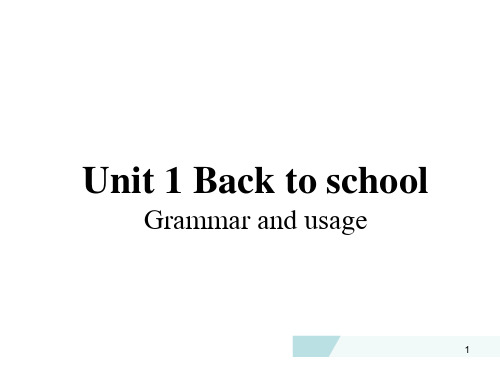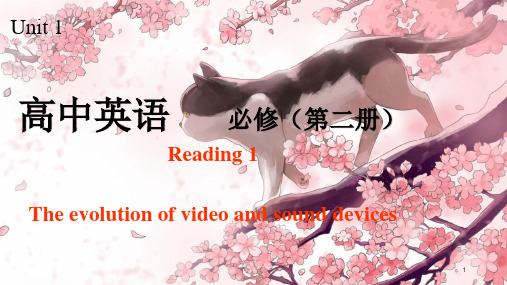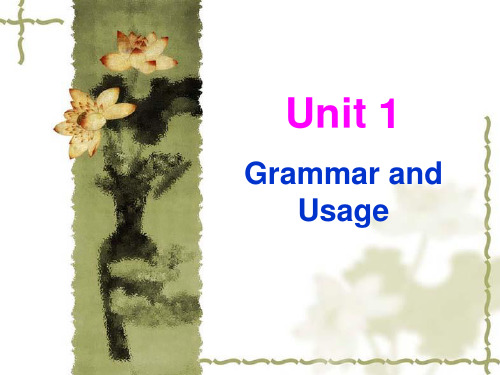牛津高中英语高一上ppt课件M2U1Grammar and usage
合集下载
牛津高中英语模块一_unit__Grammar_and_usage课件(PPT))

在定语从句中,关系词可以充当从句
中的:
• subject 主语
•predicative 表语
• object 宾语
关系代词
• attribute 定语 • adverbial 状语
关系副词
As subject 主语 The boy is Tom. The boy is smiling.
The boy who is smiling is Tom. The boy is Tom. The boy has a round face.
3.She is no longer the girl that she used to be
that指_人_或__物___, 在从句中做 主_语_或__宾_语_或_表_语__,作_宾_语____时可以省略。
• The teacher praised the student whose English is the best in our class.
Step 1. 确定主句,找相同成分
Join the following sentences(第一句话作为 主句)
The girl is Mary. We saw her yesterday.
The girl we sawthe girl yesterday is Mary.
Step 2. 把从句放到主句先行词之后
Which is the car that was made in
Beijing.
Practice
1. This is the best film __(t_h__a_t)I’ve seen. 2. That is the last lesson (_t_h__a_t)I gave you. 3. This is the very book _(_t_h_a_tI)’m after. 4. That is just the coatw__h_o__secolor is red. 5. That is the right placew__h_e_r_ehe works. 6. I still remember the schools and boys (_t_h__a_t_) I met
牛津译林版高一英语必修一unit 1 grammar 课件(共26张)

2
Exploring the rules
1. S+V
(1) The sun was shinning. (2) We all breathe, eat and drink.
3
Exploring the rules
2. S+V+P
(1) This is an English dictionary. (2) The dinner smells good. (3) The well has gone dry.
about you? (5) The old man sitting at the gate said he was ill.
9
Consolidation
Underline the attributive of each sentence. (1) What is your given name? (2) I am afraid some people forgot to sweep the floor. (3) The man downstairs was trying to sleep. (4) I am waiting for the sound of the other shoe!
Unit 1 Back to school
Grammar and usage
1
Exploring the rules
1. S+V
主语+谓语
2. S+V+P
主语+系动词+表语
3. S+V+O
主语+谓语+宾语
4. S+V+O+O 主语+谓语+间接宾语+直接宾语
5. S+V+O+C 主语+谓语+宾语+宾语补足语
Exploring the rules
1. S+V
(1) The sun was shinning. (2) We all breathe, eat and drink.
3
Exploring the rules
2. S+V+P
(1) This is an English dictionary. (2) The dinner smells good. (3) The well has gone dry.
about you? (5) The old man sitting at the gate said he was ill.
9
Consolidation
Underline the attributive of each sentence. (1) What is your given name? (2) I am afraid some people forgot to sweep the floor. (3) The man downstairs was trying to sleep. (4) I am waiting for the sound of the other shoe!
Unit 1 Back to school
Grammar and usage
1
Exploring the rules
1. S+V
主语+谓语
2. S+V+P
主语+系动词+表语
3. S+V+O
主语+谓语+宾语
4. S+V+O+O 主语+谓语+间接宾语+直接宾语
5. S+V+O+C 主语+谓语+宾语+宾语补足语
译林牛津版高中英语模块一 Unit 1 Grammar and usage 2 定语从句教学课件 (共18张PPT)

Saturday afternoon.
“......的”,表拥有、所属:不管先行词指人或指物,关系代词都用whose
Conclusion
• 1. What is the 'attributive clause' ? • 2. What is the antecedent? • 3. What is the relative pronoun? • 4. How to choose the relative pronoun?tecedent
1. The green team. The blue clothes. The red hair.
2. The team in green. The clothes in blue. The hair in red.
adjective prepositional phrase
• an enjoyable experience
•名
介词短语
昨天在会议上说话的女士是我的妈妈。
• The woman who spoke at the meeting yesterday is my mother.
定语从句
attributive clause
Attributive clauses
• An attributive clause modifies a noun or a pronoun (名词或 代词)in the same way that an adjective or prepositional phrase does.
antecedent 先行词
被定语从句所修饰 的名词或代词叫做
先行词。
relative pronoun & adverb 关系代词或副词
“......的”,表拥有、所属:不管先行词指人或指物,关系代词都用whose
Conclusion
• 1. What is the 'attributive clause' ? • 2. What is the antecedent? • 3. What is the relative pronoun? • 4. How to choose the relative pronoun?tecedent
1. The green team. The blue clothes. The red hair.
2. The team in green. The clothes in blue. The hair in red.
adjective prepositional phrase
• an enjoyable experience
•名
介词短语
昨天在会议上说话的女士是我的妈妈。
• The woman who spoke at the meeting yesterday is my mother.
定语从句
attributive clause
Attributive clauses
• An attributive clause modifies a noun or a pronoun (名词或 代词)in the same way that an adjective or prepositional phrase does.
antecedent 先行词
被定语从句所修饰 的名词或代词叫做
先行词。
relative pronoun & adverb 关系代词或副词
高中英语 新译林牛津版高一上学期必修第二册Unit1Grammar and usage 课件

Explanation: A verb-derived -ing form phrase referring to one activity singular verb Extension: Two verb-derived -ing forms/infinitives connected with an “and” but referring to one thing singular verb
9
Discussion
Practice
(1) Going to bed early and getting up early _is___ (be) a widely accepted good habit.
(2) Early to bed and early to rise makes______ (make) a man healthy, wealthy and wise.
7
Practice (1) Either you or Ih_av_e__s_ee_n____ (be) wrong. (2) I am sure that neither Jack nor his
friends ____am_________ (see) this film.
8
Discussion Case 3: Building the jungle environment on the computer is …
5
Discussion
Practice (1) This team __i_s_______ (be) the best in this city. (2) The team __a_r_e_d_r_iv_i_n_g___ (drive) to the game in their own cars
9
Discussion
Practice
(1) Going to bed early and getting up early _is___ (be) a widely accepted good habit.
(2) Early to bed and early to rise makes______ (make) a man healthy, wealthy and wise.
7
Practice (1) Either you or Ih_av_e__s_ee_n____ (be) wrong. (2) I am sure that neither Jack nor his
friends ____am_________ (see) this film.
8
Discussion Case 3: Building the jungle environment on the computer is …
5
Discussion
Practice (1) This team __i_s_______ (be) the best in this city. (2) The team __a_r_e_d_r_iv_i_n_g___ (drive) to the game in their own cars
Unit1Grammarandusage课件高中英语牛津译林版(2020)

2.谓语(verb/predicate)
说明主语的动作、状态和特征 (“做什么”“是什么”或“怎么样”)
情态动词
动词的分类
助动词 系动词 实义动词
及物动词 不及物动词
(1)简单谓语:由一个动词或动词短语构成 He practices running every morning.
(2)复合谓语:由情态动词或助动词加动词原形构成 You may keep the book for two weeks.
(1) She has lunch happily. (2) He arrived in London yesterday..
SVP 主语+系动词+表语
此类型的句子,谓语动词不能表达一个完整的意思,必须加 上一个表明主语性质或状态的表语,才能表达完整的意思。
常见的系动词: be动词类: am, is , are , was, were 感官动词类:look, sound, smell, taste, feel
可接“双宾语”的动词 (1)V.+sb.+sth.=V. +sth. + to + sb.
give, tell, lend, sell, teach, send, bring, write, take, offer, pass, return, promise, show, throw, hand, award等
5.定语(attributive) 修饰或限制名词或代词,翻译成
“……的”
由名词、代词、数词、形容词、副词、介词短语、V-ing、Ved、不定式、定语从句等充当。
This is an apple tree.
(名词)
He is our friend.
Unit 1 Grammar and usage 课件高中英语牛津译林版(2020)必修第一册

•What is a goal?
•What’s the significance of setting goals?
•What’s the structure of Miss Yan’s speech?
• Subject:
• a noun, noun phrase or pronoun representing the person or thing that
• He speaks English very well. • I come here to see you. • The boy was praised for his bravery. • When she was 12 years old, she began to live in Dalian. • It rained heavily, causing severe flooding in that country.
• It can either be in front of or behind the noun.
• The boy in blue is Tom. • The number of boy students is 24. • The boy there needs a pen. • Can I have something to drink? • The smiling boy needs a pen bought by his mother. • Please pass me the book which the teacher gave you yesterday.
• [Adverbial]:
• Adverbials are generally played by adverbs, prepositional phrases, participles and participle phrases. Its position is generally placed at the end of a sentence, but it can also be placed at the beginning or in a sentence.
Unit1 Grammar and usage 课件-高一上学期英语牛津译林版(2020)必修第一册

sentence structures
(1) I agree.
C a n yo u te ll if th e v e rb h e re is tra n sitiv e o r in fe re n tia l?
sentence structures
(3) These habits will be helpful.
sentence elements
表语
It refers to the component after a connecting verb, usually indicating the identity, characteristics, and state of the subject.
It’s a lovely day.
_____o_b_j_e_c_t_______.
❉ Some verbs can have two objects. The indirect object usually
refers to a person and the direct object a thing. ❉ The object complement adds more information about the object.
linking verbs
am, is, are
was, were
being
have/has/had been
e.g. He is a teacher. It was fantastic. She is being kind today. They have been poor since last year.
W h a t is sp e c ia l a bo u t th e v e rb h e re ?
译林牛津版高中英语M2 U1 Grammar and usage 教学课件 (共16张PPT)

in August, 2013,
stay in Cambodia
in Nov, 2013,
and Vietnam
inclJiumlyb, 2L0a1n3g, shan
enjoy Yueyang Tower with foreigners
Step 2 Description
in July, 2013, enjoy Yueyang Tower with foreigners In July, 2013, Jerry enjoyed Yueyang Tower with foreigners.
Describe two pictures by using the proper tense.
Description
in June, 2013, have a good time in Guangzhou
in Nov, 2013, climb Langshan
Five months after Jerry _h_a_d__h_a_d__a_g_o_o_d__t_im_,e
water lily in Changsha.
Step 3 Presentation of past perfect tense
1 Self-study Have a self-study of the tense in 8 minutes
and find out the answers to the following questions: What is past perfect tense? What is its form?
__h_a_d_s_t_a_y_e_d_ in Cambodia and Vietnam
for a week.
牛津译林版高中英语必修一高一英语课件Unit1Grammarandusage

5. Thatistherightplace_w__h_o_se_theystudy.
6. Istillremembertheschoowlshaenrdeboys______Imet
here.
(that)
7.Everything__(t_h_a_t_)yousaidistrue. 8.Whichisthebook___(_t_hyaot)uwant? 9.Whoisthegirl____th__astitsthere. 10.All__(_th__aht)esaidistrue. 11.All__th__a_t issaidbyhimistrue. 12.Arethereanyproblems___th_atrt ouble you? 13.Iwillmakefulluseofthetime ____(_th_atht)ereisleftforme.
2.Thegirlsinred. prepositionalphrase
3.Thegirlswhoarewearingred. attributiveclause
Concept Anattributiveclausemodifiesanounint hesamewaythatanadjectiveorpreposit ionalphrasedoes.Thenounitmodifiesis calledanantecedent.
关系代词 that,which,who,whom和 whose的用法
关系代词who指人,作主语或宾语 (作宾语常可省略);whom指人, 作宾语;whose指人或物,作定语; which指物,作主语、宾语、表 语;that指人或物,作主语、宾语、表 语;as指人或物,作主语、表语,as 的作用接近who和which;
高中英语_牛津译林版_高一上册_模块1 Unit 1 School lifegrammar and usage2_精品课件

The astronaut (whom Harry porter met in space) is Yang Liwei .
whose指人或物, 作定语 (不可省略)
He is the character of the book. Its name is Harry Potter. He is the character of the book (whose name is Harry Potter).
where needs me.
which/that
^ ❖ 4. Those haven’t been to the West Lake will gatherwaht othe school gate.
高中英语_牛津译林版_高一上册_模块 1 Unit 1 School lifegrammar and usage2_精品课件
9. He lives in a house the window of __w__h_ic_h__ faces south
10. Those _w_h_o______learn not only from books but also through practice will succeed.
高中英语_牛津译林版_高一上册_模块 1 Unit 1 School lifegrammar and usage2_精品课件
关系代词
Antecedent Subject Object Possessive Predicati
(先行词) (主
(宾语)(所属关系)ve(表语)
语)
Persons who whom whose
that
(指人) that
who
that
Things
whose指人或物, 作定语 (不可省略)
He is the character of the book. Its name is Harry Potter. He is the character of the book (whose name is Harry Potter).
where needs me.
which/that
^ ❖ 4. Those haven’t been to the West Lake will gatherwaht othe school gate.
高中英语_牛津译林版_高一上册_模块 1 Unit 1 School lifegrammar and usage2_精品课件
9. He lives in a house the window of __w__h_ic_h__ faces south
10. Those _w_h_o______learn not only from books but also through practice will succeed.
高中英语_牛津译林版_高一上册_模块 1 Unit 1 School lifegrammar and usage2_精品课件
关系代词
Antecedent Subject Object Possessive Predicati
(先行词) (主
(宾语)(所属关系)ve(表语)
语)
Persons who whom whose
that
(指人) that
who
that
Things
Unit 1 Grammar and usage 课件-高一英语牛津译林版选择性必修第一册

5
cooking, from boiling noodles in the pot to frying steak in the pan. I hardly eat out any more. Not only is cooking at home cheaper, but I can cook exactly what I want. It's healthier too. No wonder people say nothing beats home cooking! Now I am good at cooking a couple of dishes. My plan is to invite my friends over at the weekend to show them my new-found skills. I hope that they will like my ager to try new restaurants.
To eat out was also a social activity to (2) _e_n_h_a_n_c_e_t_h_e__ _re_l_a_t_io_n_s_h_i_p__ with friends.
There are lots of (3) _re_c_i_p_e_s_ to choose from. It offers (4)d_e_t_a_il_e_d_i_n_s_tr_u_c_t_i_o_ns for users to follow step by step. Cooking at home is (5)_c_h_e_a_p_e_r.
The author can cook exactly what he wants.
Cooking at home is (6)h_e_a_l_t_h_ie_7r.
cooking, from boiling noodles in the pot to frying steak in the pan. I hardly eat out any more. Not only is cooking at home cheaper, but I can cook exactly what I want. It's healthier too. No wonder people say nothing beats home cooking! Now I am good at cooking a couple of dishes. My plan is to invite my friends over at the weekend to show them my new-found skills. I hope that they will like my ager to try new restaurants.
To eat out was also a social activity to (2) _e_n_h_a_n_c_e_t_h_e__ _re_l_a_t_io_n_s_h_i_p__ with friends.
There are lots of (3) _re_c_i_p_e_s_ to choose from. It offers (4)d_e_t_a_il_e_d_i_n_s_tr_u_c_t_i_o_ns for users to follow step by step. Cooking at home is (5)_c_h_e_a_p_e_r.
The author can cook exactly what he wants.
Cooking at home is (6)h_e_a_l_t_h_ie_7r.
相关主题
- 1、下载文档前请自行甄别文档内容的完整性,平台不提供额外的编辑、内容补充、找答案等附加服务。
- 2、"仅部分预览"的文档,不可在线预览部分如存在完整性等问题,可反馈申请退款(可完整预览的文档不适用该条件!)。
- 3、如文档侵犯您的权益,请联系客服反馈,我们会尽快为您处理(人工客服工作时间:9:00-18:30)。
Look at the sentences and find the difference:
Tom has rung up three times this morning.
Now it is still in the morning.
Tom rang up three times this morning.
5. How long have you been here?
1. The form of the present perfect tense:
We form the present perfect tense with have/has and the past participle of the verb.
1. We have studied English d there since 1990. 3. She hasn’t finished her homework yet. 4. Eric has just come back.
past and is still happening now.
I haven’t seen you for ages. He has just gone out. It has been very cold lately. She has already finished her homework. He hasn’t seen her since the meeting.
past, but are connected to the present.
I have not seen Justin since last Friday
night. Note: We also use the present perfect tense to talk about something that started in the
Note: We use the present perfect tense when the exact time of an action is not clear or important.
We use it with time expressions such as: already ever for just lately never recently since yet We use already for affirmative statements, yet for negative statements. We use for + a period of time, since + a point in time.
e.g. They say that they have been to America many times. Note: We can also use the present perfect tense for repeated actions, that is, we use the present perfect tense with the time expressions once/twice/three times…
He has just gone out.(= He went out a few minutes ago.) I have just heard the news. (= Now I know the news.) Note: We use the present perfect tense to talk about actions that were completed only a short time ago.
3. Eric left home last year and has just come back. 4. They bought this house three years ago and they have lived here since then. 5. My brother went to see my grandpa last week. He has visited him three times this month.
Unit 1 Tales of the unexplained Grammar
Present perfect tense &
Present prefect continuous
tense
Lead-in
Look at the following sentences and try to explain why the tense is used in these sentences.
have (has) +过去分词
2. The uses of the present perfect tense:
Justin has disappeared, so Kelly is very sad.
Note: We use the present perfect tense to talk
about things that happened in the recent
Now it is not still in the morning.
Note:
Actions occurring in an incomplete period might be indicated by today or this morning/afternoon/ evening/ week/ month/ year/ century or all
day/night/week, all the time, always etc.
Point out what tense or tenses are used in the sentences and the reasons why they are used.
1. We have studied English for about five years. We began to study it five years ago. 2. They moved to the south in 1990 and have lived there since then.
